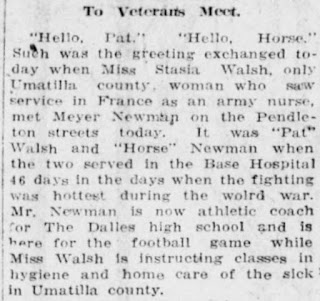She also identified herself as a veteran, a complicated thing for a woman following World War I.
The Pendleton East Oregonian featured a brief account titled "T[w]o Veterans Meet" in October 1919 that presented Walsh as a veteran of the war.
 |
| "T[w]o Veterans Meet," Pendleton East Oregonian, October 25, 1919, 1. |
 |
| "[I]s Member of Legion," Pendleton East Oregonian, January 12, 1920, 6. |
In January 1920 the East Oregonian noted that Walsh had decided to join the veteran group the American Legion as the only woman member of the Pendleton post. We don't have a record of her thoughts on this, but she did choose to join the primarily male American Legion during her time in Umatilla county. When women who served overseas in the First World War created a parallel organization, the Women's Overseas Service League, Walsh joined the Oregon branch by 1925 (see the WOSL's magazine Carry On, vol. 4, no. 1 (February 1925): 35.
It is interesting to think about the implications of Walsh's decisions to identify as a veteran. Newspapers underscored her postwar professional life as stemming, in part, from her wartime service. Several of the articles I've posted here emphasized that Walsh was, as the article above stated, "the only Umatilla county woman who served in France as an Army nurse." And Walsh had lived through dangerous and difficult and sometimes enjoyable times in France as a member of Base Hospital 46, with male and female comrades. After the war women who had these experiences worked to be accepted as veterans, just as they had worked to be accepted in the male military.
Walsh had a new adventure on the horizon, as we'll see in the next post.



